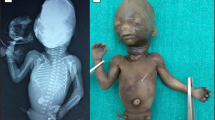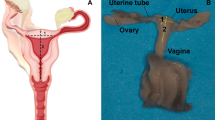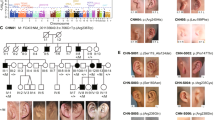Abstract
EXPERIMENTAL1 and morphological2 evidence suggests that exencephaly and anencephaly represent different degrees of severity of cranioschisis. Their morphogenesis seems to involve a primary disturbance of the cephalic somites and notochord. Both conditions are experimentally inducible in several species by the action of different causal factors and teratogens3–7. Moreover, exencephaly has been observed occasionally in gene mutants, for example in the mouse8, though rarely with complete penetrance in the affected strains9, and apparent autosomal recessive inheritance of neural tube defects has been suggested to occur at least in some instances in man10,11. Therefore, it can be assumed that the aetiology of cranioschisis is at least complex and multifactorial involving environmental agents as well as genetic factors. But so far, defects belonging to this entity have not yet been observed in human or other mammalian chromosome mutation syndromes. In this respect it seems of interest to report the finding of exencephaly as constant and characteristic feature of trisomy of chromosome 12 in the mouse foetus.
This is a preview of subscription content, access via your institution
Access options
Subscribe to this journal
Receive 51 print issues and online access
$199.00 per year
only $3.90 per issue
Buy this article
- Purchase on Springer Link
- Instant access to full article PDF
Prices may be subject to local taxes which are calculated during checkout
Similar content being viewed by others
References
Marin-Padilla, M., and Ferm, V. H., J. Embryol. exp. Morph., 13, 1 (1965).
Marin-Padilla, M., Virchows Arch. path. Anat. Physiol., 339, 245 (1965).
Hamburgh, M., Nature, 169, 27 (1952).
Giroud, A., and Martinet, M., Acta anat., 44, 358 (1960).
Kalter, H., and Warkany, J., Am. J. Path., 38, 1 (1961).
Renwick, J. H., Br. J. prev. soc. Med., 26, 67 (1972).
Poswillo, D. E., Sopher, D., and Mitchell, S., Nature, 239, 492 (1972).
Grüneberg, H., J. Genet., 52, 52 (1954).
Lyon, M. F., Phillips, R. J. S., and Searle, A. G., Genet. Res., 5, 448 (1964).
Penrose, L. S., J. ment. Defic. Res., 1, 4 (1957).
Fuhrmann, W., Seeger, W., and Böhm, R., Humangenetik., 13, 241 (1971).
Gropp, A., Winking, H., Zech, L., and Müller, H. : Chromosoma, 39, 265 (1972).
Gropp, A., and Zech, L. in 23rd Nobel Symp. Chrom. Identif., 118 (edit. by. Caspersson, T., and. Zech, L.). (Academic Press, 1973).
Cattanach, B. M., Williams, C. E., and Bailey, H., Cytogenetics, 11, 412 (1972).
White, B. J., Tjio, J.-H., van de Water, L. C., and Crandall, C., Cytogenetics, 11, 363 (1972).
Author information
Authors and Affiliations
Rights and permissions
About this article
Cite this article
GROPP, A., KOLBUS, U. Exencephaly in the syndrome of trisomy No. 12 of the foetal mouse. Nature 249, 145–147 (1974). https://doi.org/10.1038/249145a0
Received:
Issue Date:
DOI: https://doi.org/10.1038/249145a0
This article is cited by
-
Chromosomal control of early embryonic development in mice I. Experiments on embryos with autosomal monosomy
Genetica (1983)
-
Mice with Robertsonian translocations in experimental biology and medicine
Genetica (1980)
-
A comparison between trisomy 12 and vitamin A induced exencephaly and associated malformations in the mouse embryo
Virchows Archiv A Pathological Anatomy and Histology (1980)
Comments
By submitting a comment you agree to abide by our Terms and Community Guidelines. If you find something abusive or that does not comply with our terms or guidelines please flag it as inappropriate.



